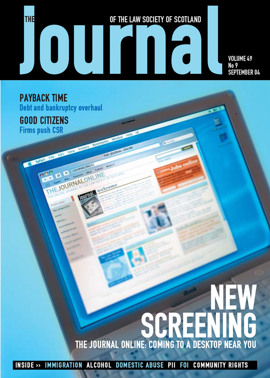Winning around a table
In the September 2003 Journal (page 53), we discussed the jurisprudence of the Court of Arbitration for Sport (“CAS”) and its ad hoc Division that has been used at sporting events. The ad hoc Division has operated at every Olympic Games since 1996 and at the recent XXVIIIth Olympiad in Athens the court was particularly busy. CAS’s jurisprudence falls into two brackets, namely appeals from decisions of sporting governing bodies (relating either to sanctions for sporting indiscipline or anti-doping violations) and arbitration regarding sports-related disputes referred by the parties. The rules of CAS provide that it has no jurisdiction to consider sporting disputes concerning on-field decisions. The ad hoc Division differs in that its jurisdiction extends to such sporting disputes. There were a number of such cases at the recent Olympics, in spite of the impassioned plea from one athlete before the Division that “medals should be won on the playing field and not around a table”.
“The table” comprises a tribunal of 12 experts in arbitration and sports law, headed by a President who monitors every case and approves the decision. On receipt of a complaint, the President establishes a panel of three arbitrators and appoints a hearing, whilst notifying all interested parties and witnesses. The arbitrators were on-site throughout the Olympics and accordingly, hearings could be called at short notice. In every case, a decision was rendered within 24 hours. Whilst this presents a considerable logistical challenge, the rationale of tournament-based dispute resolution is to ensure the speedy resolution of disputes and allow the tournament to continue unabated so that tournament and television schedules are met and associated revenues earned. Moreover, most Olympic teams have dedicated in-house counsel who are on hand to rapidly prepare and present their party’s case.
The ad hoc Division becomes involved once the applicable International Federation (“IF”) has concluded its final decision on the matter, IFs overseeing and officiating in their respective sports at the Olympic Games. One such case was that of the joint appeal by the National Olympic Committees of France, Great Britain and USA in relation to the eventing competition. The appeal was directed against the decision of the Federation Equestre Internationale (“FEI”) appeal committee overturning the decision of the FEI ground jury who imposed a time penalty on the German equestrian Bettina Hoy. Hoy was competing in the eventing competition, judged by the ground jury consisting of three persons who officiate by ruling on competitors’ times and impose penalties where appropriate. The dispute centred on the fact that Hoy had crossed the starting line, starting her ride, and had then circled and re-crossed the starting line and effectively attempted to start again. The ground jury decided that, as a matter of fact, her time ran from the first time she crossed the line and she had failed to complete the course within the allocated time, despite the stadium clock being mistakenly reset when she re-crossed the line. Consequently, Hoy thought she had more time than she actually did. The CAS panel found that the decision of the ground jury to impose a time penalty on Ms Hoy was “of a purely factual nature falling within its exclusive jurisdiction” according to the rules of the sport. Essentially they preserved the authority of the ground jury to referee the competition. Whilst sympathy can be felt for the athlete, medals should not be won when the rules of the sport are broken.
The Olympic movement’s influence is far-reaching and the ad hoc Division’s activity at recent Olympic Games is a factor in more cases coming before CAS that closely relate to “sporting decisions”. An example is the recent appeal of the Football Association of Wales relating to Russian footballer, Igor Titov. Titov failed his drug test following Russia’s Euro 2004 play-off match against Wales, which Russia won over two matches. The Welsh FA unsuccessfully argued that the Russian team should have been replaced at Euro 2004 by the Welsh, given the player’s anti-doping violation. The case was of note given that the Welsh FA were able to persuade CAS that they had jurisdiction to hear their complaint, something that was disputed both by UEFA and Russia, as it essentially sought to nullify a sporting result.
Disputes in sport are now readily litigated upon and CAS’s ad hoc Division and similar dispute resolution forums are set to incur increasing and more varied workloads, with more disputes considered that closely relate to sporting decisions.
Bruce A Caldow, Sports Practice Group, Harper Macleod
In this issue
- Profession's voice must be heard
- Let the cameras speak
- Vision on
- Forgive us our debts
- Written down
- DAS: the broader picture
- A lost message
- For the greater good
- Start your engines
- Are you covered?
- Opportunity knocks
- Rock bottom?
- BAILII looks for help
- On level ground
- Taking freedom seriously
- Taking out abuse
- Be ready for the options hearing
- Now it's collaborative
- Winning around a table
- Website reviews
- Scottish Solicitors' Discipline Tribunal
- Book reviews
- Beware all conveyancers!
- A-day looms closer






